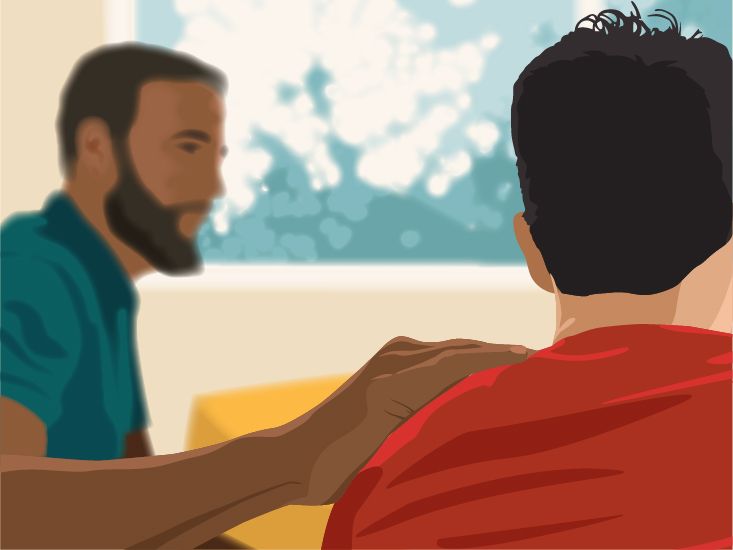
We include products we think are useful for our readers. If you buy through links on this page, we may earn a small commission. Here’s our process.
Healthline only shows you brands and products that we stand behind.
Our team thoroughly researches and evaluates the recommendations we make on our site. To establish that the product manufacturers addressed safety and efficacy standards, we:- Evaluate ingredients and composition: Do they have the potential to cause harm?
- Fact-check all health claims: Do they align with the current body of scientific evidence?
- Assess the brand: Does it operate with integrity and adhere to industry best practices?
During these trying times, it’s possible to see the direct link between our mental health and our overall well-being.
Within most of my community, there’s a common experience emerging.
We’ve all been put on time out — as if we’ve been sent to a meditation retreat we didn’t sign up for and it’s not ending anytime soon. Our normal patterns have been interrupted and for most of us, we simply don’t know what to do about it.
For men, this presents some unique challenges.
The overwhelming response I’m hearing from men in my local and global community is that we’re being put in the unique situation of wanting to take action but not having a clear avenue to do so.
The restrictions of being in our own home as crisis occurs around us leaves us with deep feelings of fear, anxiety, and unrest. Many of our normal channels of processing are not available.
The men in my community are struggling because we can’t go to the gym, we can’t go have a burger and a beer with our buddies, and we don’t have the normal distraction of business as usual.
Psychotherapist George Faller speaks eloquently about the difference between post-traumatic stress and post-traumatic growth. Faller was a New York City firefighter and served at ground zero, and has studied what it takes to rally around a challenge and not be crushed by it.
What he found is that the very same challenging circumstances can be the seed of long-term pain, or they can stimulate action and evolution that changes our lives for the better.
To cut to the chase, the most important factor that differentiates the two is connection. Simply put, when we take on challenging moments together, we’re better able to thrive.
This is why firefighters, special forces groups, and athletes on sports teams naturally build such deep and important bonds with each other. They band together to turn toward the challenge.
The suggestions below are perhaps not “run-of-the-mill” strategies for men — and that’s exactly why they’re so potent.
We could run off some of the basics, like get some exercise and get outside in nature, but what really counts right now is connection.
Like vitamin D in wintertime, we’re all craving the human connection that matters, and this is an opportunity for men to change that paradigm for themselves and maybe even the world as a whole.
1. Feel your feelings
Emotional repression is not a good strategy for mental health. While there are times in life when it’s necessary to control our emotions, it’s crucial to find a space and time to fully feel what’s going on inside.
For many men, this might not seem like the natural thing to do. But when we don’t have a place to process our true experiences, feelings can compress and build on top of each other in an unhealthy way.
To set yourself up for success, it’s important to be proactive.
Online therapy and mental health apps are booming and widely available. Both Talkspace and BetterHelp are worth checking out.
Taking proactive actions for your mental health not only gets you the support you need, it also helps break down the cultural stigma that can be a barrier to other men getting help.
Online men’s groups, like the ones we hold at EVRYMAN, are easy ways to get in the groove of being honest about what you feel. These are peer support groups that follow a very simple and approachable method.
We slow down and pay attention to what we feel.
During this time of isolation, many of the men who participate in our groups report feeling great amounts of anxiety, fear, and even panic. Other men are feeling ashamed, lost, and confused.
By coming together to share, we learn that it’s normal to feel these things, and it all becomes much more manageable when we do it together.
2. Reach out to connect
We’re being presented with an opportunity to learn the true value of connection via technology. A call with your parents, a video chat with your co-workers, or a text message to a sibling can be invaluable right now.
We’re learning how deeply important these methods of communication really are. It’s easy to take these for granted in the normal course of life, but when needed, the impact of reaching out can truly be profound.
In order to make the best of these moments of connection, you can make them count by being more vulnerable and transparent.
We’re all hurting, afraid, and struggling in our own ways. When we get honest about it, we all get to show up in real support of each other.
In this respect, vulnerability is an act of leadership that’s deeply supportive of others.
3. Go inside (yourself)
It’s truly a great time for introspection and reflection.
You don’t have to become a great meditator or world-class yogi, but we can all benefit from the amazing meditation apps that are out there.
My personal favorite is Calm, and a great, approachable starting place is the 30-day meditation challenge with teacher Jeff Warren. There’s a flood of free and accessible options available on a daily basis, and they really are making a difference.
A pad of paper and a pen (or a digital version) can also be a great place to turn. Don’t overthink it — try an exercise of setting a timer and writing for 10 minutes without stopping. Let go and write anything and everything that wants to come out.
4. Take action
It might feel very tricky to take action right now, but a helpful strategy is to slow down and find small, manageable ways to move forward and orient ourselves to simple, practical actions.
What may seem mundane at first glance can bring an air of progress and forward momentum.
One participant in our men’s groups felt out of control and decided to clean out his fridge — a chore he’d been putting off for weeks. Another man found some seeds in his garage and planted a small garden on the side of his house.
Personally, my wife and I have taken this opportunity to organize our family’s daily schedule in a new and elegant way, and taking that action has led to endless benefits.
At EVRYMAN, we define leadership as the willingness to be vulnerable first.
We believe that allowing a man to openly feel and share those feelings automatically gives others the permission and safety to do the same.
We’re offering free support to men all over the world via community calls and daily drop-in groups. It’s a great place to join men from all walks of life as we band together in support and solidarity.





